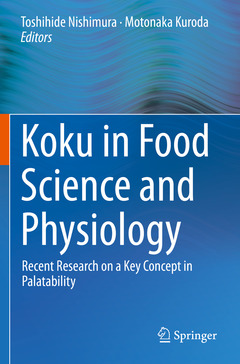Description
Koku in Food Science and Physiology, 1st ed. 2019
Recent Research on a Key Concept in Palatability
Coordinators: Nishimura Toshihide, Kuroda Motonaka
Language: English
Subjects for Koku in Food Science and Physiology:
Koku in Food Science and Physiology
Publication date: 10-2020
193 p. · 15.5x23.5 cm · Paperback
Publication date: 10-2020
193 p. · 15.5x23.5 cm · Paperback
Koku in Food Science and Physiology
Publication date: 10-2019
193 p. · 15.5x23.5 cm · Hardback
Publication date: 10-2019
193 p. · 15.5x23.5 cm · Hardback
Description
/li>Contents
/li>Biography
/li>Comment
/li>
This is the first book to explore the science underlying the concept of ?koku?, which is central to an understanding of the palatability of food within Japanese cuisine and is attracting increasing interest among food scientists and professionals worldwide. Koku may be defined as the sensation that results from the complexity of the food (i.e., its richness or body), its lingering aftertaste or persistence, and its heartiness in terms of taste, aroma, and texture. A variety of substances have been found to impact significantly on koku, including umami substances, phytosterols, certain aromatic compounds, and kokumi substances. In Koku ? Food Science and Physiology, readers will find full explanation of the conceptual aspects and the latest research results on a wide range of topics, including the relevant flavor chemistry and sensory analysis. Written by leading scientists in the field, the book will be a valuable resource for students and researchers in the fields of food chemistry, nutritional science, taste physiology, and neuroscience, as well as for professionals in the food industry.
1 What is “Koku attribute” involved in food palatability? 2 Umami and koku: essential roles in enhancing palatability of food 3 The quest for umami 4 Umami substances and fats involved in Koku attributes in sausages 5 The Components Contributing to the Thickness of Beer Aroma 6 Koku-Attribute-Enhancing Odor Compounds 7 Effect of a kokumi peptide, γ-glutamyl-valyl-glycine, on the sensory characteristics of foods 8 Mechanism of kokumi substance perception: Role of calcium-sensing receptor (CaSR) in perceiving kokumi substances 9 Mouse trigeminal neurons respond to kokumi substances 10 Overview of studies on koku.
Toshihide Nishimura (Kagawa Nutrition University, Saitama, JAPAN)
Motonaka Kuroda (Ajinomoto Co., Inc, Kanagawa, Japan)
The first scientific book focusing on the role of koku in food palatability
Discusses koku from a food science perspective
Describes the basic mechanism of koku enhancement
© 2024 LAVOISIER S.A.S.




